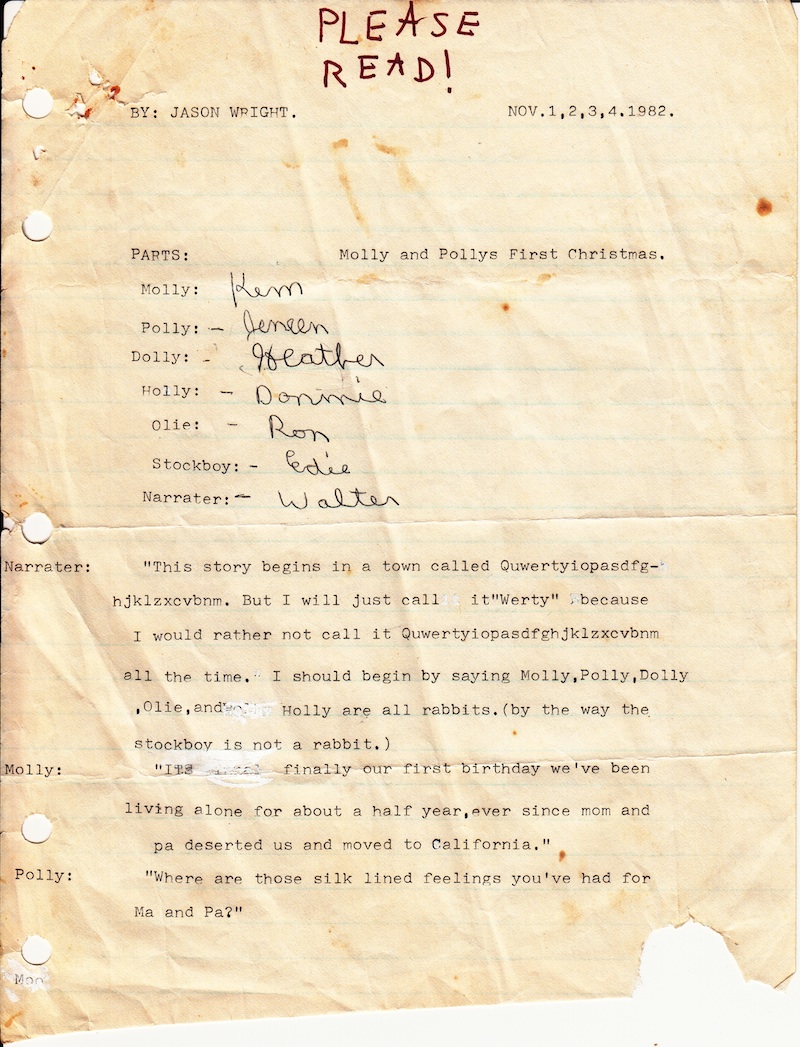
11-year-old writer submits manuscript and waits 30 years for response
[mashshare]
I submitted my first manuscript for publication 30 years ago this week. It wasn’t my first completed project, but it was the first that felt polished enough for consideration by a seasoned acquisitions editor in New York City.
It was the touching tale of two orphaned rabbits that taught the true meaning of Christmas to a ragtag bunch of bunny buddies. It was called “Molly and Polly’s First Christmas,” and I had visions of building the brand into novels, a movie and maybe a television series. It would, naturally, feature a robust merchandise line led by two white, plush rabbits with adventurous, big-button eyes and leather jackets on their backs.
I was confident I’d never written anything at this level and the time had come to test the publishing waters. After all, I wasn’t a kid anymore. I was 11.
I wrote the manuscript on my parents’ brand new IBM electric typewriter using three-hole-punched notebook paper because it was all I could find when inspiration hit. The play grew into 11 pages of riveting narration with the kind of snap, crackle and pop dialogue that grabs the audience by the collar and dares them to look away.
In addition to the strong female leads, the story also introduced the world to Dolly, Holly, Olie and a grocery stock boy. Because I wanted to show prospective publishers that the play had production viability, I talked a teacher into letting me produce and direct it for the class. I even included a short bio under the header: “ABOUT THE AURTHER.”
I also added the actors’ names on the draft I submitted, because nothing lends credibility like having the first names of my fifth-grade actors scribbled in pencil next to their roles.
Several weeks after I sent the manuscript to a publisher in the Big Apple, I received a postcard informing me that my submission had been received and was under consideration. At the time I had no idea it was merely a procedural formality. As far as I was concerned, I’d cleared the first screening and a team of highbrow men in their tweed jackets and brilliant women in their business suits were debating the marketability of “Molly and Polly.”
I never heard back. Perhaps it’s still under consideration?
Undeterred, I moved on and co-authored a nonfiction manuscript with my neighbor Sally, one of my best childhood friends. It was called, “The Ultimate Contender: When Sharks Attack,” and it went to a publisher with pencil drawings. About the same time I submitted a short manuscript about a family of mice who won the state lottery and helped free their extended family from Communist Cuba.
Neither project was published.
When I was 16 years old, my mother helped me self-publish a book of bad poetry and photographs. I called it “Sitting on the Dock” and I arranged to have it sold at local bookstores and from the trunk of my Datsun 210. It never made a best-seller list, but it did land me on the front page of the local paper and the evening news.
Years later, my wife didn’t blink when I wrote a novella called “The James Miracle” and, soon after, “Christmas Jars.” She made the idea of shifting gears from politics and public policy to a career as a writer sound the most natural thing in the world.
And isn’t that how it all started?
I’ve been surrounded my entire life by family and friends who convinced me anything was possible and that success didn’t always mean first place, a big prize, winning the part or getting the job. What a miracle that the notion of an 11-year-old boy submitting a manuscript about talking bunny rabbits was the most obvious thing in the world.
Do you have a budding artist, author, actor or athlete in your home, classroom or extended family tree? If one of them approached you today with “Molly and Polly”-sized dreams, would you pat them on the head and send them off? Or would you crouch down to eye-level, put your hands on their shoulders and respond as if their grand idea is the very best you’d ever heard?
No matter your approach, children should know that sometimes runways are longer than we’d like and it’s perfectly fine if dreams change their wings. But if they believe, and if they know you believe, too, then those dreams will eventually take flight — even 30 years later.
Exactly what did Molly and Polly teach about the true meaning of Christmas? Sorry, you’ll have to wait for the movie.

